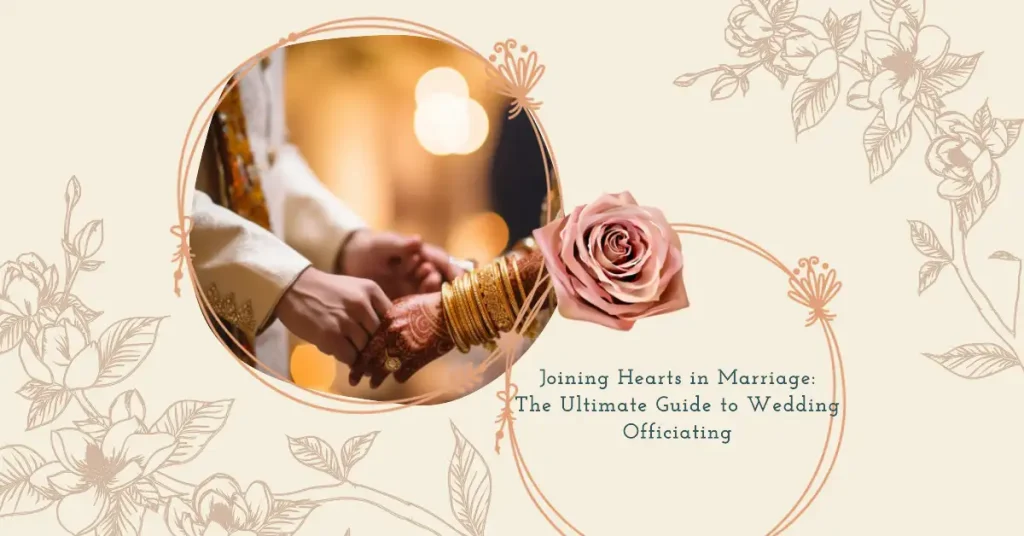Table of Contents
A civil wedding is a non-religious ceremony that is recognized by the government as a legal marriage. It offers a modern alternative to traditional religious weddings and allows couples to personalize their ceremony to reflect their beliefs and values. In this guide, we will explore the process, requirements, and benefits of a civil wedding, as well as provide tips for planning a memorable ceremony.
Key Takeaways:
- A civil wedding is a non-religious ceremony recognized by the government as a legal marriage.
- Couples can personalize their civil wedding ceremony to reflect their beliefs and values.
- A civil wedding offers a modern alternative to traditional religious weddings.
Understanding Civil Weddings
A civil wedding is a legally recognized marriage ceremony that is performed by a judge, justice of the peace, or other authorized officiant who is not affiliated with a religious organization. Unlike a religious wedding ceremony, civil weddings do not include any religious elements such as prayers, hymns, or biblical readings. Civil weddings are becoming increasingly popular due to their flexibility and ability to be personalized to fit the couple’s preferences.
When a couple chooses a civil wedding, they must obtain a marriage license from their local government office. This license is a legal document that permits the couple to marry and contains important information such as their names, ages, and residency status. After obtaining the license, the couple must schedule the wedding ceremony with an authorized officiant.
- Carter, Lisa (Author)
- English (Publication Language)
- 107 Pages - 04/06/2024 (Publication Date) - Independently published (Publisher)
Legal Aspects of Civil Weddings
One of the primary advantages of a civil wedding is that it is recognized as a legal marriage by the government. This means that the couple has all the legal rights and responsibilities that come with marriage, such as joint tax filings and inheritance rights. Additionally, civil weddings are open to all couples, regardless of their religious beliefs or sexual orientation.
During the ceremony, the officiant will guide the couple through the legal aspects of the wedding, such as the exchange of vows and the signing of the marriage certificate. It is important that the couple and the officiant adhere to all legal requirements to ensure that the marriage is valid.
The Civil Wedding Process
The civil wedding process involves multiple steps that couples need to follow in order to have a successful ceremony. While the process may vary depending on the location and local regulations, the following is a general guide of what to expect when planning a civil wedding.
Step 1: Obtain a Marriage License
The first step in planning a civil wedding is to obtain a marriage license. This can usually be done at the local city hall or county clerk’s office. The couple will need to provide identification, such as a driver’s license, and pay a fee. The marriage license is usually valid for a specific period of time, so couples should plan accordingly.
Step 2: Select a Venue
Once the marriage license has been obtained, couples can begin selecting a venue for the ceremony. Civil weddings can be held at a variety of locations, such as city halls, courthouses, parks, or private residences. Couples should consider factors such as the size of the venue, the availability of seating, and any restrictions on decorations or music.
Step 3: Schedule the Ceremony
After choosing a venue, couples should schedule the ceremony with the appropriate officiant or government official. In some cases, couples may need to make an appointment with the local city hall or courthouse to schedule the ceremony. It is important to confirm the date and time, as well as any additional requirements or documents needed for the ceremony.
Step 4: Plan the Ceremony
Once the details of the ceremony have been arranged, couples can begin planning the actual ceremony. This may involve selecting readings or music, writing personalized vows, or incorporating other special elements that reflect their relationship. Couples should discuss their preferences with the officiant or government official to ensure that the ceremony meets their expectations.
Overall, planning a civil wedding can be a straightforward process as long as couples follow the necessary steps and requirements. By taking the time to plan and personalize their ceremony, couples can create a meaningful and memorable start to their married life together.
Requirements for a Civil Wedding
Getting married in a civil ceremony requires specific paperwork and compliance with certain rules and regulations. Here are the essential requirements for a civil wedding:
| Requirement | Details |
|---|---|
| Age | Both parties must be at least 18 years old. |
| Identification documents | A government-issued photo ID, such as a driver’s license or passport, is required for proof of identity and age. Some states may require additional documents, such as a birth certificate or social security card. |
| Marriage license | A couple must obtain a marriage license from the appropriate government office, typically the county clerk’s office, prior to the wedding. The application process may require a waiting period of a few days to a few weeks, depending on the location. |
| Ceremony officiant | A licensed officiant, typically a judge, justice of the peace, or authorized government official, is required to perform the ceremony and sign the marriage license. Some states may allow a friend or family member to officiate with temporary registration or licensing. Check local laws for specific requirements. |
It’s important to note that requirements may vary by state or municipality, so couples should always research and follow the rules for their specific location to ensure a smooth and successful application process.
Benefits of a Civil Wedding
A civil wedding offers several advantages over a religious ceremony. One of the main benefits is the flexibility to customize the ceremony to suit the couple’s preferences. Unlike a religious wedding, there are no set rules or requirements for a civil ceremony, allowing couples to tailor their wedding to reflect their beliefs, values, and personalities.
Another advantage is inclusivity. Civil weddings are open to everyone, regardless of their faith or religion, which makes them an excellent choice for couples from diverse backgrounds or those who do not practice any religion.
In addition, civil weddings are recognized by the government as legal marriages, providing couples with the same rights and benefits as couples who are married in a religious ceremony.
Finally, civil weddings tend to be more cost-effective than religious weddings, making them an excellent option for couples on a budget.
Planning a Memorable Civil Wedding
Planning a civil wedding is not only a more flexible option than a religious ceremony, but it can also be more personal and unique. To ensure a memorable experience, here are some tips to keep in mind:
| Tip | Description |
|---|---|
| Budget Wisely | Consider hiring a wedding planner or using online resources to determine the cost of the ceremony. Set a budget and stick to it. |
| Choose an Officiant | Research local officiants and select one that aligns with the couple’s values and beliefs. Meet with the officiant beforehand to discuss ceremony details. |
| Personalize Your Vows | Use this opportunity to write heartfelt vows that reflect the couple’s relationship and unique story. Consider adding personal touches, such as inside jokes or shared interests. |
| Select Readings and Music | Choose readings that resonate with the couple’s beliefs and values. Select music that sets the tone for the ceremony and reflects the couple’s personalities. |
| Add Creative Elements | Consider incorporating unique elements into the ceremony, such as a unity candle lighting or a hand-fasting ceremony. Use decorations and props to set the tone and create a romantic atmosphere. |
By taking these tips into consideration, couples can create a personalized and memorable civil wedding ceremony that reflects their unique love story.
The Civil Wedding Ceremony
The civil wedding ceremony typically follows a simple structure that can be customized to reflect the couple’s personalities and preferences. Here are the basic steps:
| Step | Description |
|---|---|
| Entrance | The couple and wedding party enter the ceremony space. |
| Welcome and introduction | The officiant welcomes the guests and introduces the couple. |
| Reading | A reading of the couple’s choosing is presented. |
| Vows and ring exchange | The couple exchanges vows and rings. |
| Declaration of intent | The couple makes a legal declaration of intent to marry. |
| Signing of the marriage certificate | The couple and witnesses sign the marriage certificate. |
| Pronouncement of marriage | The officiant declares the couple married and invites them to kiss. |
| Exit | The couple and wedding party exit the ceremony space. |
In addition to the basic steps, couples may choose to incorporate other elements such as readings, music, or rituals that are meaningful to them. The structure of a civil wedding ceremony allows for flexibility and personalization, making each ceremony unique and special.
Customizing Your Civil Wedding
A civil wedding ceremony provides a unique opportunity to infuse your personality, beliefs, and values into your special day. Here are some suggestions for customizing your civil wedding:
- Pick a theme: Whether it’s a cultural or seasonal theme, a shared interest, or a reflection of your favorite color scheme, picking a theme can help guide your decor choices and create a cohesive atmosphere.
- Write your own vows: Writing your own vows allows you to express your love and commitment in your own words. Consider adding personal anecdotes, inside jokes, or meaningful quotes.
- Choose unique readings: Consider incorporating a poem, song lyrics, or a passage from a favorite book into your ceremony. This can add a personal touch and create a memorable moment.
- Add personalized rituals: Incorporating a ritual or tradition that is meaningful to you and your partner can make your wedding ceremony more special. This could be lighting a unity candle, exchanging gifts, or planting a tree together.
- Design your own program: Creating a program that outlines the details of your ceremony can be a great way to share your story with your guests. Consider including photos, a timeline of your relationship, or a thank-you message to your loved ones.
- Add unique decor: From centerpieces to lighting, adding unique decor elements can make your ceremony more memorable. Consider incorporating sentimental items, like family heirlooms, or DIY projects that reflect your personalities.
Remember, your civil wedding ceremony can be as traditional or non-traditional as you want it to be. The most important thing is that it reflects your unique love story and celebrates your commitment to one another.
Legalities and Responsibilities
Civil weddings have specific legal requirements and responsibilities that must be met to ensure the marriage is valid and recognized by the government. These responsibilities fall on both the couple getting married and the officiant who performs the ceremony.
Before the ceremony, the couple must obtain a valid marriage license from the local government. They must also provide identification documents and any additional paperwork required by the authorities. The couple must ensure that they meet the age restrictions and any other legal requirements set by their state or country.
During the ceremony, the couple and the officiant have specific legal responsibilities to fulfill. The couple must exchange legally binding vows and sign the marriage certificate in the presence of the officiant and witnesses. The officiant must ensure that the ceremony meets all legal requirements and that the marriage certificate is signed and filed with the appropriate authorities.
It is important to choose an officiant who is authorized and licensed to perform civil weddings in your jurisdiction. Check with your local government to ensure that your chosen officiant is recognized and licensed to perform the ceremony.
Celebrating Your Civil Wedding
After the civil wedding ceremony, it’s time to celebrate! There are many ways to commemorate your special day with family and friends. Here are some ideas to get you started:
- Host a small reception: A civil wedding can be a cost-effective option, so consider using some of the savings to treat your guests to a meal or drinks. Choose a venue that suits your style and budget, whether it’s a restaurant, park, or backyard.
- Plan a party: If you prefer a more laid-back celebration, throw a party with friends and family. Consider renting a space or hosting the event at home, and don’t forget the food, drinks, and music!
- Take a honeymoon: Just because your wedding was simple doesn’t mean your honeymoon has to be. Consider treating yourselves to a special trip, whether it’s a weekend getaway or a longer adventure.
Whatever you choose, remember that the most important thing is to celebrate your love and commitment to each other. A civil wedding may be less traditional, but it offers the opportunity to create a more personalized and unique celebration that reflects your values and personality.
Conclusion
Choosing a civil wedding ceremony can be a modern and personalized option for couples. Civil weddings are recognized by the government as valid marriages and offer flexibility in ceremony customization, inclusivity, and the ability to incorporate personal beliefs and values. With proper planning and attention to legal requirements, couples can create a memorable and meaningful ceremony that reflects their unique relationship and style.
Whether it’s a simple and intimate affair or a grand celebration with family and friends, a civil wedding ceremony can be a beautiful start to a lifelong journey together.
FAQ
Q: What is a Civil Wedding?
A: A civil wedding is a modern ceremony that is recognized by the government as a legally valid marriage. It differs from a religious ceremony and offers a more personalized and flexible approach to tying the knot.
Q: What is the process of a Civil Wedding?
A: The civil wedding process involves several steps. First, you need to obtain a marriage license. Then, you can select a venue and schedule the ceremony. It’s important to follow the chronological guide to ensure a smooth process.
Q: What are the requirements for a Civil Wedding?
A: To have a civil wedding, you need to meet certain requirements. These may include age restrictions, identification documents, and any additional paperwork required by local authorities. It’s essential to ensure you have all the necessary documents for a successful application.
Q: What are the benefits of a Civil Wedding?
A: Choosing a civil wedding offers several advantages. It allows for greater flexibility in customizing the ceremony to reflect your beliefs and values. It is also inclusive of various religious and non-religious backgrounds and provides the opportunity to create a unique and meaningful experience.
Q: How can I plan a memorable Civil Wedding?
A: Planning a memorable civil wedding involves budgeting, selecting an officiant, and considering personalized elements such as vows, readings, and music choices. It’s important to make the ceremony reflect your relationship and preferences.
Q: What does a typical Civil Wedding ceremony look like?
A: A typical civil wedding ceremony follows a structure that includes the entrance, exchange of vows and rings, signing of the marriage certificate, and the pronouncement of marriage. You can personalize the ceremony to make it unique and meaningful to you.
Q: How can I customize my Civil Wedding?
A: There are many ways to personalize a civil wedding ceremony. You can add readings, rituals, decorations, and other creative elements that reflect your relationship and values. Expressing your individuality will make the ceremony more memorable.
Q: What are the legal responsibilities during a Civil Wedding?
A: Both the couple and the officiant have legal responsibilities during a civil wedding. It’s crucial to meet all the legal requirements and ensure that the ceremony follows the necessary procedures. The officiant may have specific obligations to fulfill as well.
Q: How can I celebrate my Civil Wedding?
A: After the civil wedding ceremony, you can celebrate in various ways. Consider options for receptions, parties, and other post-ceremony festivities. It’s important to budget and plan a celebration that is meaningful for you and your guests.
Q: What is the conclusion of a Civil Wedding?
A: In conclusion, a civil wedding offers a modern and personalized alternative to traditional religious ceremonies. It provides flexibility, inclusivity, and the opportunity to create a unique and meaningful experience. Consider a civil wedding for your own special day.






